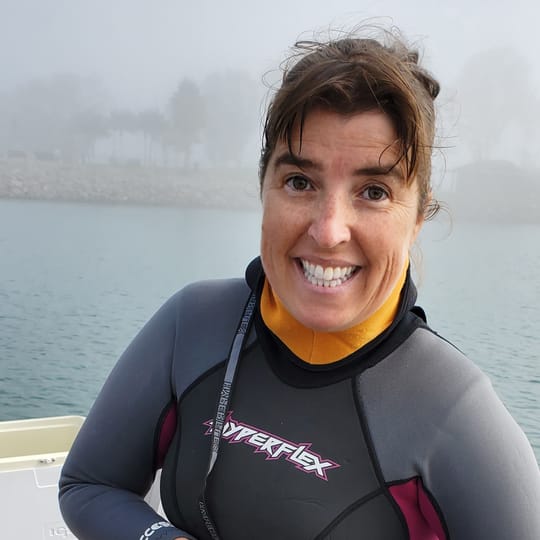
Nancy Caruso Leads Fight for Southern California’s Marine Life
By Theertha Hariharan Arulmozhi
With a career spanning decades in which she has inspired countless volunteers and established numerous successful ocean restoration projects, marine biologist Nancy Caruso is a beacon of hope for Southern California's marine ecosystems, as she specializes in restoring its struggling kelp forests and abalone habitats.
Caruso's journey of becoming an oceanographer began in the fourth grade, when a teacher's lesson on plate tectonics ignited her passion for the field.
"The concept of there being land that was moving around under the ocean kind of blew my little ten-year-old mind," Caruso says. “I was like ‘Woah, what are the people called that study that?’ And my teacher said, ‘Those are oceanographers.' I was like, ‘That’s what I want to be.’”
Caruso’s determination and dedication to pursuing her passion in marine and earth science, despite facing many struggles, has led her to making major positive impacts on the environment and those working with and around her.
Throughout her career, Caruso has faced numerous challenges, including having her restoration efforts stopped by the government and being laid off from her job three times during her kelp restoration project. Her unwavering determination and passion have been the driving forces behind her success.
However, Caruso has still been repeatedly barred by the government from carrying out her restoration projects. “They say they’re working on guidelines, but in the meantime nothing is getting done,” Caruso explains. “And, unfortunately, the government doesn’t move fast. Like I said, they’ve been working on the kelp guidelines for restoration for seven years. I don’t have that much time to wait, and neither do the abalone." she states, highlighting the urgency of her work and her frustration towards the speed of government response.
“Why is [taking from the ocean] so easy and why is what I’m doing so hard?” Caruso questions. “It should be, at the very least, an even playing field, or what I’m doing should be easier. Putting things back [in the ocean] should be easier than taking.”
Despite facing multiple obstacles in the form of layoffs and issues with the government, Caruso persevered and eventually founded her own nonprofit organization: Get Inspired. This move allowed her to continue her vital work without the constraints of traditional employment in the scientific field.
Caruso's approach to marine conservation is uniquely hands-on and community-oriented. Caruso has engaged thousands of volunteers and students in her projects, believing in the power of education and direct involvement. "I've had about four thousand volunteers help me with my projects. And if you count students, add another fourteen thousand," she says.
What sets Caruso apart from others in her same field, however, is not just her scientific expertise, but also her ability to inspire and mentor the next generation of marine biologists and scientists. Caruso believes that the most exciting, important part of her career isn’t the actual restoration, but rather the people she meets and the connections she makes along the way. "I’m proud of that, but it’s all of those acquaintances and friends that I got to bring along with me that is really, really exciting,” Caruso says. “You know the students that helped me publish papers when they were in high school, one of them works for SpaceX now... I think that’s the most exciting part—the networking and the relationships and the excitement."
Caruso’s philosophy for life and work is simple but incredibly meaningful and powerful: "Keep your head down and do the work." This mantra has served her well, especially in the face of competition and setbacks. Caruso emphasizes the importance of persistence and tenacity, stating that, "It's not about publicity and saying what you're going to do, it's about doing it."
Despite her previous challenges and those that she continues to face, Caruso remains optimistic and driven. She continues to push for more efficient and effective conservation efforts, advocating for streamlined processes that would make restoration work easier and more impactful. Most importantly, Nancy Caruso’s ability to view her vast career humbly and recognize herself as someone responsible for educating and inspiring the next generation of scientists and marine biologists truly proves her deserving of everything that she has achieved and will continue to achieve throughout her career.


